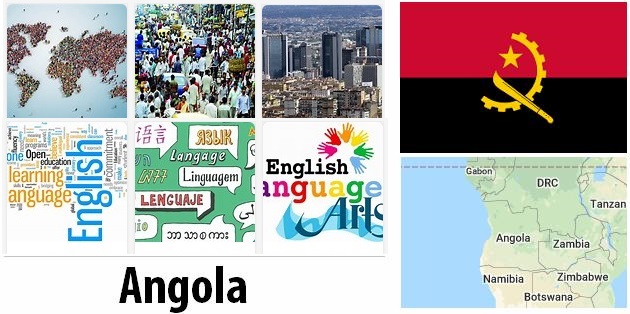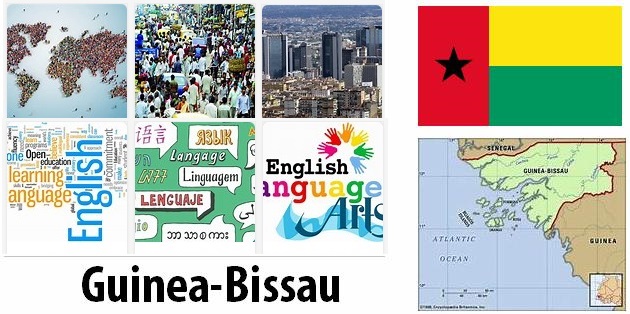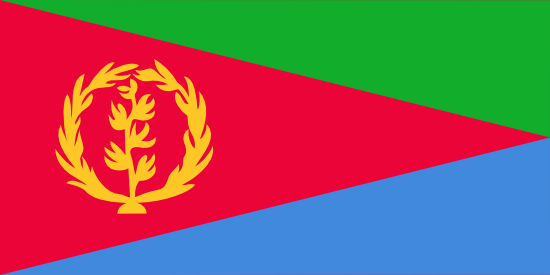Angola Population and Language
Angola houses about 90 different ethnic groups, the majority of whom are Bantu people. Three out of four residents belong to one of the three largest peoples: ovimbundu, mbundu and bakongo. Population growth is high and the population is young. Nearly half of Angolans are under 15 and only a few percent are over 60.
During the civil war in Angola 1975–2002 (see Modern history), between 600,000 and 1.5 million people were killed. Even during periods of ceasefire, many Angolans died due to starvation, malnutrition and lack of health care. Among other things, the war has resulted in Angola having a surplus of women: of 100 women there are 94 men.
Traditionally, Angolans live in rural villages and rely on what they cultivate. However, the war forced many people to flee to the cities (see also Current policy).
- COUNTRYAAH.COM: Key populations estimated size and data of Angola, including population density of how many people per square mile. Also included are facts for population and language.
About 4.5 million Angolans who fled the country during the war have now returned to their old homelands. From neighboring countries, over 400,000 Angolan refugees have returned home, while around 100,000 are still living outside Angola.
The largest population is ovimbundu, which constitutes just over one third of the population. They speak the language of Umbundu and live mainly in the fertile highlands of central Angola. A quarter of the residents belong to mbundu, whose language is kimbundu. Mbundu resides primarily in the capital Luanda, the coastal region and the river Kwanza’s valley. Bakongo is domiciled in northwestern Angola, speaks kikongo and makes up about one seventh of the population. Other ethnic groups include lunda-chokwe, nganguela and nanyeka-nkhumbi.
The urban population is largely made up of so-called assimilados, that is, Europeanized Angolans of African origin, and mestiços, which are of mixed African and European (mainly Portuguese) descent. Mestiços play an important role in the country’s political and economic life, despite being only a few percent of the population. The same goes for many assimilados.
At Angola’s independence from the colonial power Portugal in 1975, most Portuguese left the colony. However, the oil boom in Angola, in combination with the economic crisis in Portugal, has caused many Portuguese to re-apply to Angola during the 2010 century. Of the 70,000 foreign nationals living in Angola, most are Portuguese, Chinese or Brazilian.
Portuguese is the official language. It is spoken by about half of the population, mainly residents of the larger cities. The majority of about 40 indigenous languages are Bantu languages, which nine out of ten Angolans usually speak within their own population.
FACTS – POPULATION AND LANGUAGE
Population
ovimbundu 37%, mbundu 25%, bakongo 13%, other 25% (estimate)
Number of residents
29 784 193 (2017)
Number of residents per square kilometer
24 (2017)
Percentage of residents in the cities
64.8 percent (2017)
Nativity/birth
41.8 per 1000 residents (2016)
Mortality/mortality
8.5 per 1000 residents (2016)
Population growth
3.3 percent (2017)
Fertility rate
5.7 number of births per woman (2016)
Percentage of women
51.0 percent (2017)
Life expectancy
62 years (2016)
Life expectancy for women
64 years (2016)
Life expectancy for men
59 years (2016)
Language
Portuguese is officially language 1
- Otherwise, Umbundu, Kimbundu, Kikongo, Chokwe and other local languages are spokenSources
2014
December
Human rights groups protest against violence
Human rights groups are calling on the authorities to stop what they describe as the cruel and inhumane treatment of migrants from other parts of Africa. The call comes since more than 3000 migrants have been arrested and arrested in Luanda.
November
Amnesty International faces charges against Angola
Amnesty International accuses the government of virtually banning regime-critical protests in practice. According to the human rights organization, more than 20 protest actions have been slaughtered with “disproportionate” much violence over the past two years. Amnesty writes that the Angolan security forces have in many cases also carried out extra-judicial executions of oppositionists.
October
The country joins the UN Security Council
Angola is elected to the UN Security Council for a two-year term.
May
Protesters make accusations against security forces
Government-critical protesters say they have been beaten and arrested for protesting that three activists have been killed by security forces.
Census in Angola
The first census since 1970 is carried out during the last two weeks of the month.




